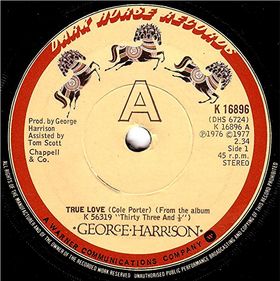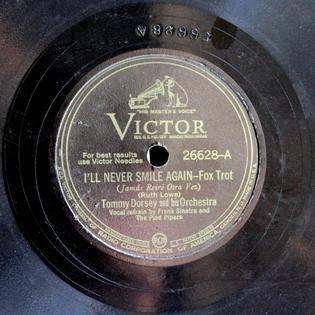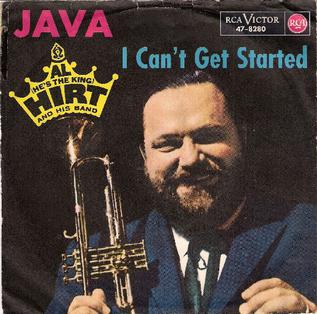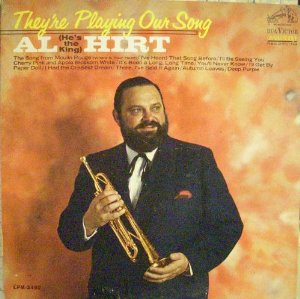Related Research Articles

Alois Maxwell "Al" Hirt was an American trumpeter and bandleader. He is best remembered for his million-selling recordings of "Java" and the accompanying album Honey in the Horn (1963), and for the theme music to The Green Hornet. His nicknames included "Jumbo" and "The Round Mound of Sound". Colin Escott, an author of musician biographies, wrote that RCA Victor, for which Hirt had recorded most of his best-selling recordings and for which he had spent most of his professional recording career, had dubbed him with another moniker: "The King." Hirt was inducted into The Louisiana Music Hall of Fame in November 2009.

"True Love" is a popular song written by American songwriter Cole Porter, published in 1956. The song was introduced by Bing Crosby and Grace Kelly in the musical film High Society. "True Love" was nominated for the Academy Award for Best Original Song. Kelly's contribution on the record is relatively minor, duetting with Crosby on only the final chorus. Nonetheless, the single is co-credited to her.
"If " is a popular song with music written by Tolchard Evans and the lyrics written by Robert Hargreaves and Stanley J. Damerell. The song was written in 1934, but the most popular versions were recorded in 1950-1951. Perry Como's version, recorded November 28, 1950, was a number-one hit on the Billboard charts for eight weeks. The Como version was released under the following labels and catalog numbers:
"Fools Rush In" (1940) is a popular song. The lyrics were written by Johnny Mercer with music by Rube Bloom.

"I'll Never Smile Again" is a 1940 song written by Ruth Lowe. It has been recorded by many other artists since, becoming a standard.

"Al di là" is a song written by Italian composer Carlo Donida and lyricist Mogol, and recorded by Betty Curtis. The English lyrics were written by Ervin Drake. The song was the Italian entry in the Eurovision Song Contest 1961, performed in Italian by Curtis at the Palais des Festivals in Cannes, France, on 18 March 1961, after Curtis had won the 1961 edition of the Sanremo Music Festival on 2 February 1961, which served as the Italian national selection from 1958 to 1966.
"I've Heard That Song Before" is a 1942 American popular song about nostalgia with music by Jule Styne and lyrics by Sammy Cahn. It was introduced by Martha O'Driscoll in the 1942 film Youth on Parade. The song was nominated for the Academy Award for Best Original Song in 1942 but lost out to “White Christmas”.
"How Deep Is the Ocean " is a popular song written by Irving Berlin in 1932. The song was developed from an earlier Berlin song "To My Mammy" which was sung by Al Jolson in his film Mammy (1930). In the earlier song, the lyrics include the questions "How deep is the ocean? / How high is the sky?" and this was the genesis of "How Deep Is the Ocean?".

"Up Above My Head" is a gospel song of traditional origin, first recorded in 1941 by The Southern Sons, a vocal group formed by William Langford of the Golden Gate Quartet. In the version that is now the best-known, it was recorded in 1947 by Sister Rosetta Tharpe and Marie Knight as a duo.
"Music to Watch Girls By" was the first Top 40 hit by Bob Crewe using his own name, recorded by his group The Bob Crewe Generation. The music was composed by Sidney "Sid" Ramin.
"Last Date" is a 1960 instrumental written and performed by Floyd Cramer. It exemplifies the "slip note" style of piano playing that Cramer made popular. It peaked at number 11 on the country chart and at number two on the Hot 100 behind "Are You Lonesome Tonight?" by Elvis Presley. Cramer's recording inspired a number of successful cover versions, including a vocal adaptation by Conway Twitty.

"Java" is an instrumental adaptation from a 1958 LP of piano compositions, The Wild Sounds of New Orleans, by Tousan, also known as New Orleans producer/songwriter Allen Toussaint. As was the case of the rest of Toussaint's LP, "Java" was composed at the studio, primarily by Toussaint.
"Personality" is a popular song with lyrics by Johnny Burke and music by Jimmy Van Heusen. It was written for the 1946 film Road to Utopia, and Dorothy Lamour performed it in the movie. Van Heusen said that he wrote the song with a limited vocal range to accommodate Lamour.
"Cotton Candy" is an instrumental written by Russ Damon and was recorded by Al Hirt for his 1964 album, Cotton Candy. The song was also featured on Hirt's greatest hits album, The Best of Al Hirt.
"Sugar Lips" is a song written by Billy Sherrill and Buddy Killen and was recorded by Al Hirt for his 1964 album, Sugar Lips. The song reached #30 on the Billboard Hot 100 and #3 on the Adult Contemporary chart in 1964.
"Fancy Pants" is a song written by Floyd Cramer and was recorded by Al Hirt for his 1965 album, That Honey Horn Sound. The song reached #47 on the Billboard Hot 100 and #9 on the Adult Contemporary chart in 1965.
"Keep The Ball Rollin'" is a song written by Denny Randell and Sandy Linzer was recorded by Jay & the Techniques.

Cotton Candy is an album by Al Hirt that was released in 1964 by RCA Victor. The album features the Anita Kerr Singers.

Sugar Lips is an album by Al Hirt released in 1964 by RCA Victor.

They're Playing Our Song is an album by Al Hirt released by RCA Victor in 1965. The album was produced by Jim Foglesong. It was recorded at Webster Hall in Manhattan, New York City.
References
- ↑ Al Hirt, "Al's Place" Retrieved April 4, 2013
- ↑ Al Hirt's "Al's Place" Chart Positions Retrieved April 4, 2013